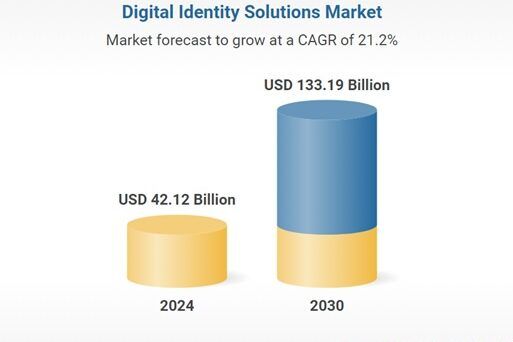The rise of digital identity management has transformed the way we interact online, but it also brings challenges around security, privacy and trust. Blockchain technology is emerging as a cornerstone of these solutions, providing decentralized, transparent and secure frameworks for managing identities.
We talk to Sebastian Rodriguez, Chief Product Officer at Privado ID, who outlines the role of blockchain in digital identity solutions.
Self-sovereign identity: A user-centered model
Self-sovereign identities (SSI) allow users to control their data and ensure privacy. By decentralizing data management, blockchain eliminates dependence on centralized institutions, creating systems where trust is embedded in the technology itself.
The self-sovereign identity model is at the core of blockchain-based digital identity systems. Unlike traditional systems, in which organizations store and control user data, SSI puts users at the center.
Blockchain acts as a verifiable store of credentials, allowing users to securely manage their identities. Rodriguez explains that this approach provides critical benefits such as credential revocation, key rotations, and trust registrations.
“Blockchain is one of many components that play a role in self-sovereign identity solutions. These types of solutions place the user at the center of the data exchange and are based on consent. This is what really helps to improve the security and privacy of the user, because he is the real owner of his data,” Rodriguez said in an interview with BeInCrypto.
Privado ID uses advanced cryptographic techniques, including Zero-Knowledge Proofs, to guarantee data privacy.
This ensures that users can verify their login credentials without revealing sensitive information. Combined with smart contracts, this method enables reliable identity verification processes, removing dependence on central authorities.
Blockchain’s primary function in identity systems is to anchor trust. It provides a public, immutable registry for credentials issued by trusted organizations, such as governments or financial institutions.
This allows users to verify the authenticity of credentials, while publishers can revoke them if necessary. According to Juniper Research, the automation of identity and money laundering checks, coupled with the blockchain to verify digital identity, could enable savings of up to 50% of banks’ existing costs within a few years.
By separating data storage from verification processes, blockchain ensures security while maintaining flexibility for cross-platform use. This model is especially effective in industries such as finance, healthcare and governance, where trust and compliance are paramount.
Challenges in Blockchain-based Identity Systems
Despite the promise, blockchain-based digital identity systems face critical adoption limitations. One challenge is ensuring accessibility for non-crypto-native users. Rodriguez emphasizes the importance of hiding complex blockchain processes from users.
“In general, it is better to hide the blockchain from end users if we aim for mass adoption outside the crypto community – we are competing with the convenience of Google and Apple. Convenience has won the battle against privacy time and time again. To win this battle we must accept that the user experience is crucial,” said Rodriguez.
To tackle these barriers, Privado ID uses a ‘blockchain light’ approach. This method minimizes user interactions with blockchain, focusing on seamless integration between networks. Cross-chain interoperability is another crucial feature.
“Our system verifies credentials without the need for blockchain transactions, making it chain-agnostic,” said Rodriguez.
Reusable Know Your Customer (KYC) credentials are changing financial services. Users complete KYC verification once, with credentials stored in decentralized tokens for use across multiple platforms.
This reduces costs for institutions while improving user privacy. Additionally, blockchain-based age verification systems are being applied in online services and gaming, ensuring compliance without revealing sensitive user data.
The future of Blockchain in digital identity
The evolution of digital identities is poised to redefine online trust and security. Rodriguez believes blockchain will play a central role in this transformation.
“Identity is bigger and broader than blockchain – and its evolution in the coming years will impact every aspect of our digital lives. We’ve lived without a strong, trusted identity for years, using our social accounts as proxies for our identity – but there’s a reason you can’t use an email address to vote or buy a house. AI will push the boundaries of our trust and sense of ownership to the point where trusted identities will be a must. Ten years from now, we will remember the current state of the Internet as the ‘wild’ days, just as we remember the 1990s as the ‘naïve’ years,” Rodriguez said.
The global size of the digital identity solutions market is expected to grow from $42 billion in 2024 to $133 billion in 2030.

Digital Identity Solutions Market Forecast 2030. Source: Research & Markets.
As digital identity systems mature, they must balance privacy, security and ease of use. Rodriguez emphasizes that user experience will be critical for widespread adoption.
Blockchain’s ability to provide transparency and security while respecting user privacy positions it as a game-changer in digital identity. With more and more innovations on the horizon, blockchain-based identity systems are poised to transform the way we interact and transact online.
Credit : cryptonews.net













Leave a Reply